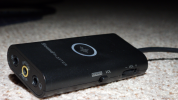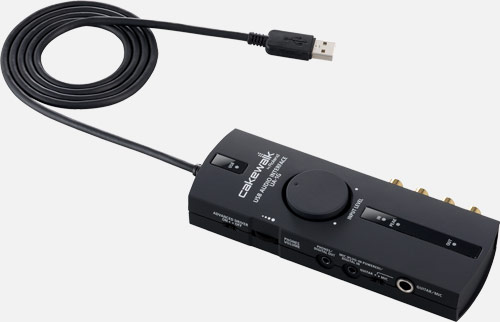tl;dr under the "-----"
Since late spring/early summer, I've been using and loving my Topping G5 as my main DAC.
I love it so much that I use it for everything! What's "everything"?
- biking
- walking
- PC sound (including podcasts)
and even
- the DAC for my hi-fi!
The G5 sounds just as good through its headphone amp'd output, whether it's in high gain with the volume down, or low with the volume up, it always sounds the same.
Which is great for a DAC. Consistency like that, I appreciate.
I have a bit of a problem with the G5, though. Not anything to do with its performance, but the fact that it's a battery powered device.
It lasts about 12 hours on a full charge, and if you keep a lithium ion battery charged between 5 and 65%, you can essentially get 9x the total watt-hours into and out of the battery (yes, NINE times). Taking this into account, the battery will last 6 years (running 24/7 with 500 cycle battery)
But..........
There is no percentage indicator on the G5! And percentage isn't communicated over Bluetooth, either. Obviously I've monitored how long it takes to charge the device and estimated the length of time it takes to get to 65% from when the low battery indicator light comes on [at 5%], but I make mistakes sometimes. I also fall asleep (I guess that could be considered a mistake). Anyway, since each screw-up deducts 9 {NINE} cycles, you can see that it doesn't take many of them to severely affect my G5's lifespan. With my rate of mistakes, it'll probably need a new battery in less than 3 years.
And all the work and constant attention! After these few months, it's starting to get to me... I do this with my phone and I don't mind, and I thought I wouldn't mind the G5, but when I bought the G5, I assumed there would be a way to determine the battery's state of charge... There's not! Ha-ha!
"-----"
I'm looking for something that performs as well, or nearly as well as my G5 that I can use with only my PC. I chose PC because I spend more time on it than walking/biking/hi-fi. Even combined, I spend more time on the PC than the other 3 lol (it'd be weird if I didn't, right?!)
My budget is 175USD/225CAD. I can go over by a bit, but that's the target.
My lowest impedance headphones are 40 ohms, my usual are (I believe) in the low 50s.
I'd like it to be able to do DSD and MQA, but it's not a deal breaker if it can't.
I kind of want to stir things up a bit and go with an AKM DAC instead of ESS. Don't ask why, I know the chip is less important than its implementation. I just want it implemented well like the ES9068AS is in the G5.
I'm really enjoying the fact that a couple manufacturers finally decided to put out DACs that aren't fundamentally flawed in the obvious ways that most older DACs are now known to be...
I'd like to see them do their best with some lower-tier chips in the $50 price category. That'd make things interesting!
Since late spring/early summer, I've been using and loving my Topping G5 as my main DAC.
I love it so much that I use it for everything! What's "everything"?
- biking
- walking
- PC sound (including podcasts)
and even
- the DAC for my hi-fi!
The G5 sounds just as good through its headphone amp'd output, whether it's in high gain with the volume down, or low with the volume up, it always sounds the same.
Which is great for a DAC. Consistency like that, I appreciate.
I have a bit of a problem with the G5, though. Not anything to do with its performance, but the fact that it's a battery powered device.
It lasts about 12 hours on a full charge, and if you keep a lithium ion battery charged between 5 and 65%, you can essentially get 9x the total watt-hours into and out of the battery (yes, NINE times). Taking this into account, the battery will last 6 years (running 24/7 with 500 cycle battery)
But..........
There is no percentage indicator on the G5! And percentage isn't communicated over Bluetooth, either. Obviously I've monitored how long it takes to charge the device and estimated the length of time it takes to get to 65% from when the low battery indicator light comes on [at 5%], but I make mistakes sometimes. I also fall asleep (I guess that could be considered a mistake). Anyway, since each screw-up deducts 9 {NINE} cycles, you can see that it doesn't take many of them to severely affect my G5's lifespan. With my rate of mistakes, it'll probably need a new battery in less than 3 years.
And all the work and constant attention! After these few months, it's starting to get to me... I do this with my phone and I don't mind, and I thought I wouldn't mind the G5, but when I bought the G5, I assumed there would be a way to determine the battery's state of charge... There's not! Ha-ha!
"-----"
I'm looking for something that performs as well, or nearly as well as my G5 that I can use with only my PC. I chose PC because I spend more time on it than walking/biking/hi-fi. Even combined, I spend more time on the PC than the other 3 lol (it'd be weird if I didn't, right?!)
My budget is 175USD/225CAD. I can go over by a bit, but that's the target.
My lowest impedance headphones are 40 ohms, my usual are (I believe) in the low 50s.
I'd like it to be able to do DSD and MQA, but it's not a deal breaker if it can't.
I kind of want to stir things up a bit and go with an AKM DAC instead of ESS. Don't ask why, I know the chip is less important than its implementation. I just want it implemented well like the ES9068AS is in the G5.
I'm really enjoying the fact that a couple manufacturers finally decided to put out DACs that aren't fundamentally flawed in the obvious ways that most older DACs are now known to be...
I'd like to see them do their best with some lower-tier chips in the $50 price category. That'd make things interesting!


